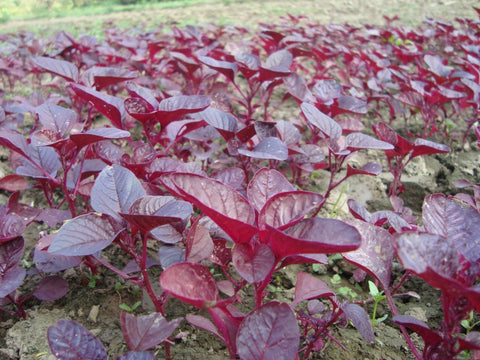How Are Beets Good for You?
Are beets good for you? Whether they're fresh, canned, frozen, or taken as a powder supplement, the health benefits of beets come in many different forms. Beets should be a functional part of any balanced diet because of the health benefits they offer and nutrients that include but aren't limited to:
- Nitrate
- Selenium
- Manganese
- Copper
-
Zinc
Beets are well studied for their nitrate content, which is about 250 mg per 100 grams of beets. When ingested in the body, that nitrate converts to nitric oxide during the body's digestion process. The concentration of nitrate from beets makes it a powerhouse in the nitrate-rich class of vegetables, including arugula, red spinach, swiss chard, cilantro, and leafy greens.
The increase of nitric oxide production in the body helps increase and sustain energy, but are beets good for you if you want to increase focus? Yes! Here is a look at how the nitrates and other nutrients found in beets can support energy and mental clarity.
Vasodilator Foods Boost Energy Levels

Beets contain potent antioxidants with high levels of betalain and carotenoid, shown to affect fatigue. Betalains, a pigment known to reduce oxidative stress, are antioxidants found abundantly in beets that also give beets their signature deep crimson color. Betalains are also found in prickly pear, swiss chard, and amaranth.
β-carotene and lutein are the carotenoids found in beets and are essential to reducing free radicals in the body. Red carotenoids are found in watermelon, grapefruit, guava, and beets. These antioxidants work to reduce oxidative stress, which brings balance back to cells - equilibrium.
Nitric oxide promotes a healthy flow of oxygen and nutrients to cells and tissue, helping the body perform optimally. The more oxygen the body can use efficiently, the higher the potential of our performance output.
When we lack sufficient nitric oxide, our tissues and organs suffer from an inadequate supply of oxygen. When the body does not get enough oxygen, it severely affects physical performance, mental clarity, and endurance needed to sustain activities throughout the day. Boosting nitric oxide by consuming beets and other nitrate-rich vegetables not only gives athletes the performance they need for endurance but helps anyone in search of a clean energy source. The more we build our endurance, the more we can train our bodies to endure longer workouts, increase productivity, and add more of the activities we love that make life enjoyable.
Beets Improve Mental Clarity and Health
Mental focus and fatigue are inversely related; as mental fatigue grows, it impairs performance, according to a study published in the Journal of Clinical Medicine. The high concentrations of nitrate in beets promote blood flow to the brain, which also improves oxygen levels to the brain. As we get older, our mental and cognitive functions decline. Once we consume higher amounts of nitrate from vegetables like beets, our bodies work to convert that nitrate into nitric oxide, which opens the floodgates to allow optimal blood flow to the brain as well as other vital organs on the body.
On the flip side, less blood flow to the brain impairs our cognitive performance. Not only does less blood flow decrease memory functions, but it also increases our stress levels and mood. Many aren't aware of nitric oxide production's impact on our mental health.
Stress occurs when our sympathetic nervous system pumps our adrenal glands and sends our bodies into overdrive by increasing cortisol levels. As we continue to experience this stress, we start reducing our body's ability to produce nitric oxide. The consistent release of stress hormones compound stress levels and can lead to headaches, weight gain, and other problems that exacerbate nitric oxide deficiency symptoms, making it increasingly challenging to alleviate.
Are Beets Good for Older Adults?

Nitrate supplementation is essential for older adults because, as we age, nitric oxide production in our bodies declines. This affects our endurance, brain functions, and other vital systems and organs in our body.
Beets and other plant-based foods support nitric oxide bioavailability. Since it's recommended to stay physically active when we reach an older age, we must do everything we can to boost our body's ability for sustained mobility and flexibility to thrive.
While aging is a natural process, it is well within our control to optimize that process in the cleanest ways possible - through the food and beverages, we consume. How are beets good for you if you are an older adult? Simple, we lose energy levels as we get older, and much of that decline is linked to lower levels of nitric oxide. When we boost nitric oxide levels with beets, we have the potential to combat the anticipated downslope of energy that doesn't have to come with age.
Unfortunately, many aging people accept the decline in energy as a given. Boosting nitric oxide levels hasn't come into their purview as the culprit of age-related health issues, memory loss, and energy decline.
Combining exercise with an increase in foods that improve nitric oxide production, such as beets, can help stave away lifestyle-related health issues. Increasing consumption of beets positively impacts our body's overall functions and ability to charge through the day. Adding beets to any diet can help turn around overall health and wellness in the right direction, especially as we age.
Resources
Chen, Liping et al. “Beetroot as a functional food with huge health benefits: Antioxidant, antitumor, physical function, and chronic metabolomics activity.” Food science & nutrition vol. 9,11 6406-6420. 9 Sep. 2021, doi:10.1002/fsn3.2577
Montenegro, Cristhian F et al. “Betalain-rich concentrate supplementation improves exercise performance and recovery in competitive triathletes.” Applied physiology, nutrition, and metabolism = Physiologie appliquee, nutrition et metabolisme vol. 42,2 (2017): 166-172. doi:10.1139/apnm-2016-0452
Lidder, Satnam, and Andrew J Webb. “Vascular effects of dietary nitrate (as found in green leafy vegetables and beetroot) via the nitrate-nitrite-nitric oxide pathway.” British journal of clinical pharmacology vol. 75,3 (2013): 677-96. doi:10.1111/j.1365-2125.2012.04420.x
Madadi, Elaheh et al. “Therapeutic Application of Betalains: A Review.” Plants (Basel, Switzerland) vol. 9,9 1219. 17 Sep. 2020, doi:10.3390/plants9091219
Larsen, F.J., Weitzberg, E., Lundberg, J.O. and Ekblom, B. (2007), Effects of dietary nitrate on oxygen cost during exercise. Acta Physiologica, 191: 59-66. https://doi.org/10.1111/j.1748-1716.2007.01713.x
Wake Forest University. "Daily dose of beet juice promotes brain health in older adults." ScienceDaily. ScienceDaily, 2 November 2010. <www.sciencedaily.com/releases/2010/11/101102130957.htm
Slimani, M., Znazen, H., Bragazzi, N. L., Zguira, M. S., & Tod, D. (2018). The Effect of Mental Fatigue on Cognitive and Aerobic Performance in Adolescent Active Endurance Athletes: Insights from a Randomized Counterbalanced, Cross-Over Trial. Journal of clinical medicine, 7(12), 510. https://doi.org/10.3390/jcm7120510





Comments (0)
There are no comments for this article. Be the first one to leave a message!